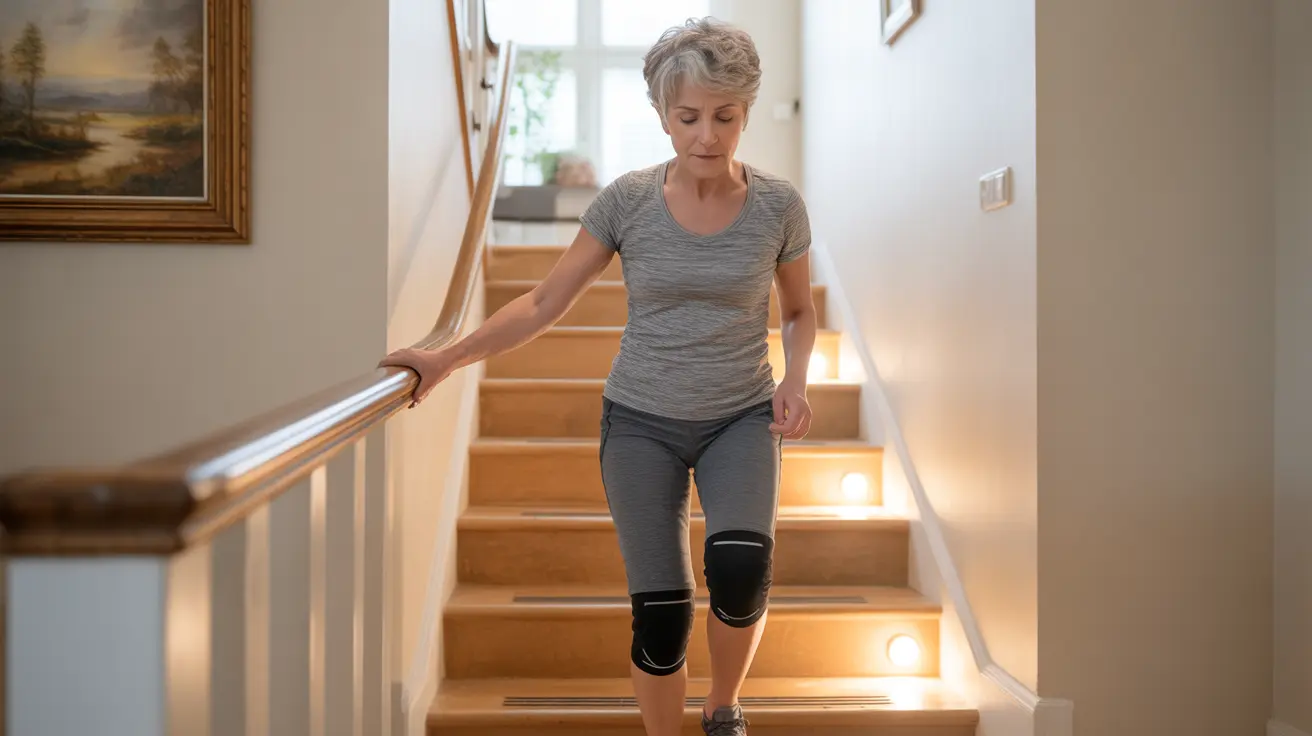Experiencing knee pain while climbing stairs is a common issue that can significantly impact daily life and mobility. Whether caused by arthritis, injury, or general wear and tear, this specific type of knee pain requires targeted solutions and lifestyle modifications to manage effectively.
Understanding how to address knee pain during stair climbing through home remedies, exercises, and proper techniques can help you maintain independence and reduce discomfort in your daily activities.
Understanding Why Stairs Cause Knee Pain
Climbing stairs places significant stress on your knee joints, with forces up to three times your body weight being transmitted through the joint. This increased pressure can aggravate existing conditions or cause pain in vulnerable knees.
Immediate Relief Strategies for Stair-Related Knee Pain
The RICE Method
One of the most effective immediate home remedies for knee pain while climbing stairs is the RICE protocol:
- Rest: Take breaks between stair climbing activities
- Ice: Apply cold packs for 15-20 minutes
- Compression: Use a supportive knee sleeve
- Elevation: Keep your leg elevated when resting
Supportive Equipment
Consider using these helpful tools:
- Proper footwear with good arch support
- Knee braces or compression sleeves
- Handrails for additional support
- Non-slip treads on stairs
Strengthening Exercises for Better Stair Climbing
Building strength in the muscles supporting your knees can significantly reduce pain when climbing stairs. Focus on these key exercises:
- Wall sits
- Step-ups
- Straight leg raises
- Hamstring stretches
- Calf raises
Proper Stair Climbing Technique
Using correct form when climbing stairs can dramatically reduce knee strain:
- Keep your body straight and centered
- Use handrails for support
- Take one step at a time
- Ensure your entire foot is on each step
- Maintain good posture throughout the movement
Lifestyle Modifications for Long-term Relief
Making certain lifestyle changes can help reduce knee pain over time:
- Maintain a healthy weight
- Stay active with low-impact exercises
- Wear supportive shoes
- Consider glucosamine supplements (after consulting healthcare provider)
- Practice regular stretching
When to Seek Professional Help
While home remedies can be effective, certain signs indicate the need for medical attention:
- Severe pain that doesn't improve with rest
- Significant swelling
- Instability or buckling of the knee
- Inability to bear weight
- Persistent pain lasting more than a few weeks
Frequently Asked Questions
1. What are some effective home remedies for knee pain while climbing stairs? The most effective home remedies include applying ice packs, using compression sleeves, practicing the RICE method, wearing supportive footwear, and using handrails for support while climbing.
2. Which exercises can help reduce knee pain and improve strength for stair climbing? Key exercises include wall sits, step-ups, straight leg raises, hamstring stretches, and calf raises. These exercises strengthen the muscles supporting your knees and improve overall stability.
3. How can I modify my stair-climbing technique to lessen knee pain? Maintain proper posture, use handrails, take one step at a time, ensure your entire foot is placed on each step, and keep your body centered while climbing stairs.
4. Does weight loss really help reduce knee pain when going up and down stairs? Yes, weight loss can significantly reduce knee pain during stair climbing. Every pound lost reduces the pressure on your knees by approximately four pounds when climbing stairs.
5. When should I see a doctor for knee pain that worsens with stair climbing? Seek medical attention if you experience severe pain that doesn't improve with rest, significant swelling, knee instability, inability to bear weight, or persistent pain lasting more than a few weeks.




